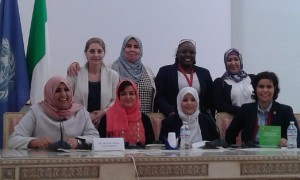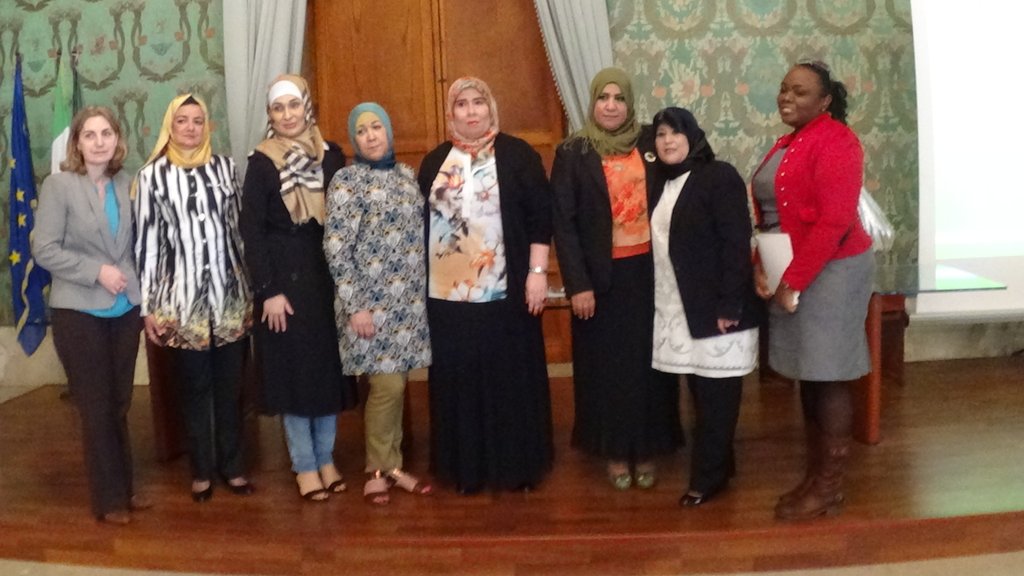By Sami Zaptia.

London, 19 April 2016:
A delegation of Libyan women activists participated in a seminar ‘Crisis in Libya: Libyan women for . . .[restrict]a network of dialogue and peace’, held in Italy on15-16 April 2016. The event was organised by the Italian non-profit organisation Minerva, with support from the Ministry of Foreign Affairs and International Cooperation.
An indication of the importance Italy attaches to understanding the Libyan situation was the participation of Ms. Marina Serini, Vice-President of the Italian Chamber of Deputies (Italian parliament), who welcomed the group and attended both days of the event to hear the views of the Libyan women civil society activists.
The event which was widely covered by the media, was opened by Mr. Francesco Italia, the deputy Mayor of Siracusa, who was proud his city was able to give a national platform to the Libyan group to raise awareness of the situation in Libya at this critical time.
The group of nine women used the opportunity to highlight Libya’s needs, how the international community could help, and appealed for greater support for the many Libyan civil society groups, who despite the risks and turmoil in Libya, are working tirelessly to find a peaceful political solution to the crisis.
The militarised situation in the country and lack of respect for women’s rights has exposed civil society activists to more dangers, but many have continued their activities regardless because they believe in the vital need for Libyan women to be included in building peace and developing Libya’s future. Libyan women in particular, have a unique and important role as mediators in the reconciliation process, with many actively working at the ‘grassroots’ level within local communities and beyond.
Participating in a series of panel discussions with Italian academics and experts, the Libyan women, presented their perspective on a ranges of critical issues facing Libya, including migration, challenges to democracy, religion, legal rights, peace building and combatting extremism.
Establishing security and stability is seen as the priority, with an appeal by Amal Elhaj for international assistance in stopping the flow of arms and money to extremist groups in Libya. Other Libyan speakers, observed that securing Libya’s borders and tackling illegal migration networks were also challenges the international community could help Libya tackle. Samira El Massodi, highlighted the important role women can have as mediators encouraging reconciliation.
The challenges and risks facing Libyans, particularly women, working in the media during this current crisis were also raised, along with an appeal for the need for press freedoms to be respected. Nadia Abusrewil stressed Libyans want peace and security, and how important it is to educate Libyan youth on leaving violence and war behind.
Meanwhile Hala Elmisrati observed the urgent need to rebuild trust among different groups if they were to co-exist peacefully in society. All acknowledged how Libyan women inside and outside the country are working to unite women across the country, and managing to achieve so much with so little.
The group concluded the event with a number of recommendations including an appeal for greater support with capacity building for Libyan civil society organisations working on empowering Libyan women, and help raising awareness of Libyan women’s democratic and human rights. International support with capacity building of Libyan women in the army and police force, and raising awareness among Libyan women of the dangers of the widespread presence of arms in their homes and communities were also recommended.
The seminar in Siracusa is one part of an Italian project, which aims to support Libyan women in overcoming the crisis in Libya, in line with UN Security Resolution 1325/2000 which supports women’s equal participation in peace negotiations and in post-conflict reconstruction.
Mr. Simone Petroni, from the Ministry of Foreign Affairs, noted the favourable timing of the seminar and said he was encouraged by the recent arrival in Tripoli of GNA Prime Minister designate Faiez Serraj, and what may be the start of a new phase in Libya. The Libyan women hope it will signal the beginning of greater efforts by the international community to support the vital contribution of Libyan women civil society groups in building a lasting peace. [/restrict]










